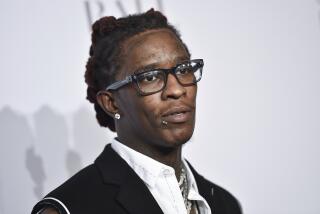Jury in Denny Beating Case Likely to Remain Anonymous, Judge Says
- Share via
Jurors in the trial of three men charged with attempting to murder truck driver Reginald O. Denny will probably remain anonymous, but are not likely to be sequestered, the judge presiding over the case said Thursday.
Superior Court Judge John W. Ouderkirk said he wanted to consider the matter further, but tentatively accepted prosecutors’ arguments that jurors need to be anonymous for their security. Defense lawyers protested, arguing that keeping jurors’ identities a secret or sequestering them could give them the impression that the defendants in the case are dangerous.
“These gentlemen are entitled to a jury of their peers,” said James R. Gillen, who represents defendant Antoine Eugene Miller. “They have a constitutional right that will be abridged by an anonymous jury.”
In this case, an anonymous jury probably would mean that attorneys would receive background information about the jurors but not their names or any other identifying information, Ouderkirk said.
Arguments regarding the jury for the case involving Miller, Damian Monroe Williams and Henry Keith Watson are heating up as the case draws closer to trial. As he has before, Ouderkirk made it clear Thursday that he does not favor delays, even though the trial’s scheduled opening March 15 could mean that it overlaps with another volatile trial in which jury selection has begun--the prosecution of four Los Angeles police officers accused of violating Rodney G. King’s civil rights.
Miller, Williams and Watson each face possible life sentences in connection with the April 29 attacks on Denny and other motorists at Florence and Normandie avenues.
In their arguments Thursday, prosecutors highlighted the enormous publicity that those televised attacks generated and said the defense position to reveal jurors’ names was an invitation for the jury to be harassed.
“For the defense to argue against an anonymous and sequestered jury is tantamount to arguing in favor of jury intimidation,” Deputy Dist. Atty. Lawrence Morrison said.
Morrison argued that only if the jury is anonymous and sequestered during the trial can jurors be protected from intimidation that might influence their deliberations. He cited the trauma suffered by many jurors in the wake of last year’s state trial of the four Los Angeles police officers accused of beating King as evidence that jurors need to be protected. Their names, protected during the trial, were made public after its conclusion.
The riots that erupted after those verdicts underscored the intense emotion that both cases spark, he added. Jurors for the federal trial of the police officers will be sequestered and anonymous, a position that was endorsed by the prosecutors and defense lawyers.
Morrison said similar protections were warranted in the trial of the men charged in the beating of Denny.
“The specter of the riots . . . hangs over this proceeding and everyone knows it,” Morrison said.
Ouderkirk, who is not convinced the jurors need to be sequestered throughout the trial, said he would make a final ruling later this month.
In the meantime, Ouderkirk disposed of a number of pretrial motions, including one to reduce Miller’s bail. Ouderkirk recently set the bail at $250,000 but lawyers asked him to reconsider because some charges against Miller have been dismissed.
Ouderkirk rejected the request, citing Miller’s criminal record, which includes several convictions for failure to appear in court.
More to Read
Sign up for Essential California
The most important California stories and recommendations in your inbox every morning.
You may occasionally receive promotional content from the Los Angeles Times.














